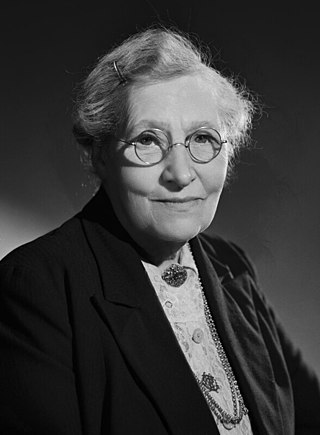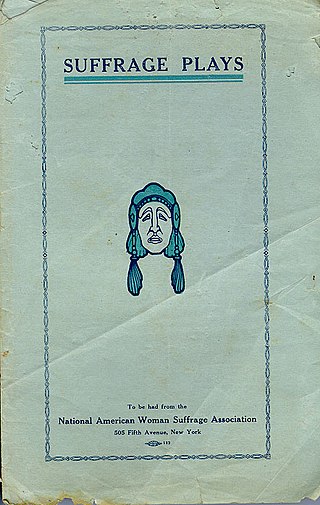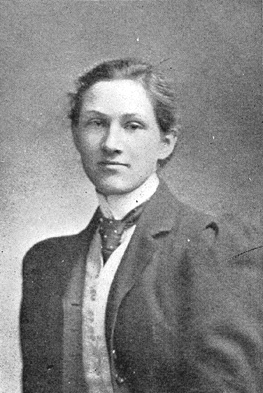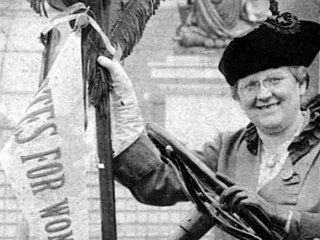Related Research Articles
Women's suffrage is the right of women to vote in elections. At the beginning of the 18th century, some people sought to change voting laws to allow women to vote. Liberal political parties would go on to grant women the right to vote, increasing the number of those parties' potential constituencies. National and international organizations formed to coordinate efforts towards women voting, especially the International Woman Suffrage Alliance.

Caroline Selina Ganley, CBE, JP was an English Labour and Co-operative Party politician.
The Co-operative Women's Guild, founded in 1883, was an auxiliary organisation of the co-operative movement in the United Kingdom that promoted women in co-operative structures and provided social and other services to its members.

Lila Meade Valentine was a Virginia education reformer, health-care advocate, and one of the main leaders of her state's participation in the woman's suffrage movement in the United States. She worked to improve public education through her co-founding and leadership of the Richmond Education Association, and advocated for public health by founding the Instructive Visiting Nurses Association, through which she helped eradicate tuberculosis from the Richmond area.

A movement to fight for women's right to vote in the United Kingdom finally succeeded through acts of Parliament in 1918 and 1928. It became a national movement in the Victorian era. Women were not explicitly banned from voting in Great Britain until the Reform Act 1832 and the Municipal Corporations Act 1835. In 1872 the fight for women's suffrage became a national movement with the formation of the National Society for Women's Suffrage and later the more influential National Union of Women's Suffrage Societies (NUWSS). As well as in England, women's suffrage movements in Wales, Scotland and other parts of the United Kingdom gained momentum. The movements shifted sentiments in favour of woman suffrage by 1906. It was at this point that the militant campaign began with the formation of the Women's Social and Political Union (WSPU).

The Working Class Movement Library (WCML) is a collection of English language books, periodicals, pamphlets, archives and artefacts, relating to the development of the political and cultural institutions of the working class created by the Industrial Revolution, in Salford, Greater Manchester, England.

Elsie Edith Bowerman was a British lawyer, suffragette, political activist, and RMS Titanic survivor.

Margaret McCoubrey (1880–1956) was a Belfast-based Irish suffragist, pacifist, and an activist in the cooperative and labour movements. Standing for the Belfast Labour Party, she was elected to Belfast City Council in 1920..

Women's suffrage in Australia was one of the early achievements of Australian democracy. Following the progressive establishment of male suffrage in the Australian colonies from the 1840s to the 1890s, an organised push for women's enfranchisement gathered momentum from the 1880s, and began to be legislated from the 1890s. South Australian women achieved the right to vote and to stand for office in 1895, following the world first Constitutional Amendment Act 1894 which gained royal assent the following year. This preceded even universal male suffrage in Tasmania. Western Australia granted women the right to vote from 1899, although with racial restrictions. In 1902, the newly established Australian Parliament passed the Commonwealth Franchise Act 1902, which gave women equal voting rights to men and the right to stand for federal parliament. By 1908, the remaining Australian states had legislated for women's suffrage for state elections. Grace Benny was elected as the first female local government councillor in 1919, Edith Cowan the first state Parliamentarian in 1921, Dorothy Tangney the first Senator and Enid Lyons the first Member of the House of Representatives in 1943.
The Women's Trade Union League, founded in 1874 and known until 1890 as the Women's Protective and Provident League, was a British organisation promoting trade union for women workers. It was established by Emma Paterson, who had seen unions managed by working women in America.

Suffrage drama is a form of dramatic literature that emerged during the British women's suffrage movement in the early twentieth century. Suffrage performances lasted approximately from 1907-1914. Many suffrage plays called for a predominant or all female cast. Suffrage plays served to reveal issues behind the suffrage movement. These plays also revealed many of the double standards that women faced on a daily basis. Suffrage theatre was a form of realist theatre, which was influenced by the plays of Henrik Ibsen. Suffrage theatre combined familiar everyday situations with relatable characters on the stage in the style of realist theatre.

Margaret Caroline Llewelyn Davies was a British social activist who served as general secretary of the Co-operative Women's Guild from 1889 until 1921. Her election has been described as a "turning point" in the organization's history, increasing its political activity and beginning an era of unprecedented growth and success. Catherine Webb considered Davies's retirement such a significant loss for the Guild that she began writing The Woman with the Basket, a history of the Guild to that time.
Mary Ann Lawrenson was an English activist in the co-operative movement and an educationalist. A co-founder of the Co-operative Women's Guild, she served as its general secretary from 1885 to 1889. She was also the first woman represented on the board of the Co-operative Union.

Edith Houghton Hooker was an American suffragist and social worker. She was a leader of the suffrage movement in Maryland in the early twentieth century and was posthumously inducted into the Maryland Women's Hall of Fame. She was a maternal aunt of actress Katharine Hepburn.

Sarah Reddish was a British trade unionist and suffragette, who was active in the co-operative movement. A supporter of women running for local elections as a springboard to gaining national voting rights, she ran for office on the Bolton School Board and was successful in her second attempt in 1899. She also ran for office as a Poor Law Guardian, and was successful, but was defeated in her attempt to become a member of the borough council. As a textile worker, Reddish knew first-hand the conditions and wages women experienced and joined unions, working as a paid organiser to help women improve their situations. She was both a socialist and a radical feminist, urging women's equality in the public sphere.
This is an overview of Women's Suffrage activism and local politics as experienced in Leigh, Lancashire between 1900 and 1914.

Hannah Winbolt (1851–1928) was a prominent advocate for women's suffrage, giving speeches across the United Kingdom on the subject of women's rights from her perspective of a working woman. Known for being an effective orator, she was one of four women honoured retrospectively by Stockport Metropolitan Borough Council, in the naming of Suffragette Square, Stockport.

Women's suffrage was granted in Virginia in 1920, with the ratification of the Nineteenth Amendment to the United States Constitution. The General Assembly, Virginia's governing legislative body, did not ratify the Nineteenth Amendment until 1952. The argument for women's suffrage in Virginia began in 1870, but it did not gain traction until 1909 with the founding of the Equal Suffrage League of Virginia. Between 1912 and 1916, Virginia's suffragists would bring the issue of women's voting rights to the floor of the General Assembly three times, petitioning for an amendment to the state constitution giving women the right to vote; they were defeated each time. During this period, the Equal Suffrage League of Virginia and its fellow Virginia suffragists fought against a strong anti-suffragist movement that tapped into conservative, post-Civil War values on the role of women, as well as racial fears. After achieving suffrage in August 1920, over 13,000 women registered within one month to vote for the first time in the 1920 United States presidential election.
Ada Broughton (1879–1934) was a British temperance campaigner, suffragette organiser and Labour councillor and alderman, prominent in Scotland in the Women's Freedom League, and in England in the Pembroke Chapel, British Women's Temperance Association, Women's Social and Political Union, and later in the Labour Party.

Mary Ellen Pollard Clarke (1862–1939) was an American suffragist. She was the editor-in-chief of the short-lived Virginia Suffrage News and the author of essays on public policy, literature, and suffrage.
References
- ↑ Smith, Harold L. (2007). The British Women's Suffrage Campaign, 1866-1928. Pearson/Longman. pp. 28–29. ISBN 978-1-4058-3284-7.